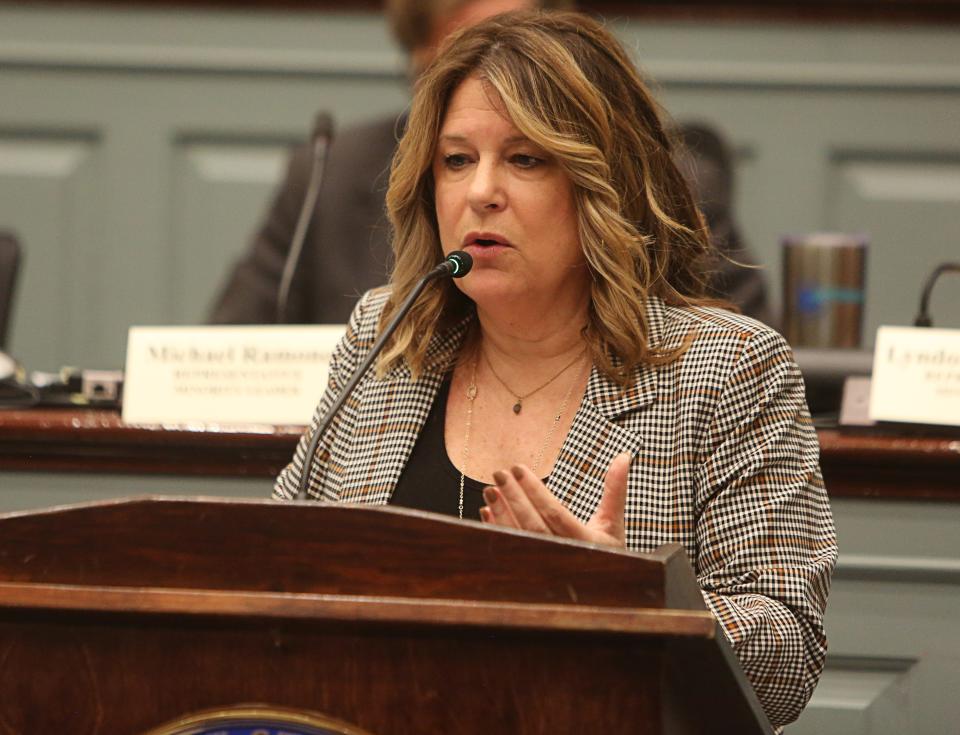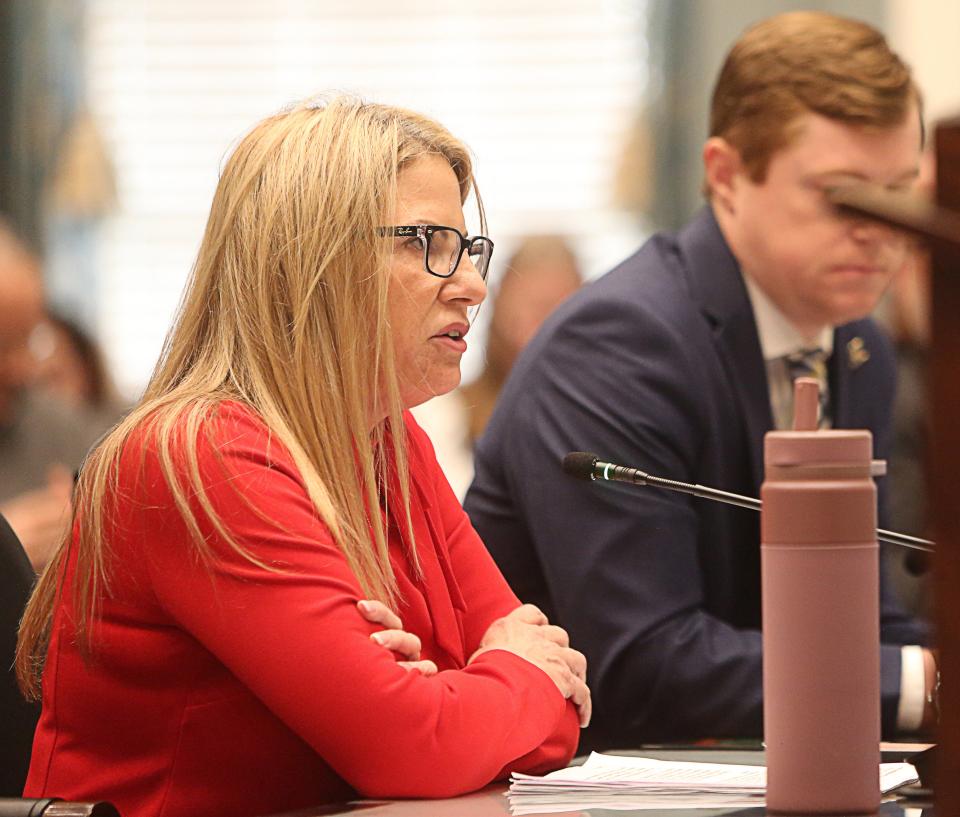Delaware hospitals say cost review board proposal a 'non-starter' for providers
Delaware’s health care providers, big and small, have come out opposing a bill that would create a hospital cost review board, saying the “politician-controlled” model would harm patient care and fail to control costs.
State House Speaker Valerie Longhurst proposed creating the “Diamond State Hospital Cost Review Board,” which would consist of five politically appointed members who would make sure any changes to hospital budgets align with Delaware’s health spending benchmarks and the health care needs of residents.
Under House Bill 350, hospitals would be required to submit their proposed budgets and financial and utilization information to the board for review and approval on an annual basis.

Longhurst said in 2018 the state established the health care spending benchmark as a way to "prevent drastic increases in costs" that could "price out" Delawareans from getting the services they need. The spending benchmark has been between 3% and 4%, but health care providers have only hit that target in 2020 during the height of the COVID-19 pandemic, she said.
"Every other year, health care spending has far surpassed the benchmark we set as a state, including years with 11% growth in health care costs," Longhurst said during Wednesday's House Administration Committee meeting discussing the bill. "And the question is why? Because we, despite setting the goal, have no mechanism as a state to help meet those targets."
Longhurst said the proposal aims to close that gap.
RELATED: Why Delaware is eying a 27% premium hike on state employees' health insurance
Health care providers and their advocates say it's a “non-starter for them.”
Brian Frazee, President & CEO of the Delaware Healthcare Association – representing several hospitals statewide, said the bill is not the best way to reduce health care costs nor ensure “robust health care delivery” in Delaware.
“This bill would take away the authority of our local community leaders who serve on our hospital boards, and give it to a politically appointed, five-member board that would essentially take control of our hospitals,” Frazee said. “We fundamentally think that that is the wrong approach because our local communities and our local community leaders know what’s best for our hospitals, and we think that should remain.”
Vermont’s hospital review board
Frazee and multiple hospital CEOs in Delaware have pointed to Vermont’s hospital cost review board as proof that the proposal won’t work. They say House Bill 350 is modeled after Vermont’s approach.
Vermont’s board, known as the Green Mountain Care Board, is a politically appointed regulator tasked with approving hospital budgets, health care provider expansions and purchases of new equipment, health insurance premium rates and serving as an “unbiased” source of information and analysis of the state’s health care system.
Experts and Vermont lawmakers and health care regulators gave VTDigger varying explanations on whether the Care Board has been successful in a report by that media outlet in 2021.
Residents and hospital leaders told the VTDigger that health care is too costly, the regulation process is too burdensome, and the Green Mountain Care Board requires sustainability plans that “may ultimately require (providers) to cut unprofitable services.”

Prior to the state implementing the Care Board, Vermont consistently ranked in the top three states in the nation for health care system performance, according to annual scorecards performed by Commonwealth Fund. In fact, in 2009, the Commonwealth Fund ranked Vermont #1 in overall health system performance.
The Commonwealth Fund is a private foundation that carries out independent research on health care issues, according to the fund’s website.
While Vermont has remained among the top states in the nation for overall health care system performance since the review board’s implementation, it has dropped in its ranking – placing fifth overall in 2022 – while health care costs have risen.
DELAWARE BUDGET: The 5 takeaways from Delaware Gov. John Carney's 2025 budget address
Health care spending per capita in Vermont has increased from $8,850 in 2010 to $12,756 in 2020, according to the latest figures available from KFF – a nonpartisan source for health policy research, polling and journalism.
Supporters say factors outside Vermont’s control, like prescription costs and the state’s aging population, have caused health care costs to rise despite the board’s interventions. Others say it's too soon to tell and the Green Mountain Care Board’s ever-expanding roles have made it challenging to assess success.
Delaware hospitals’ fears
While the First State’s proposal to form a cost review board to scrutinize hospital budgets and spending is in its infancy, downstate and small hospitals have both expressed fears over the proposal.
Jim Woodward, president & CEO of Trinity Health Mid-Atlantic, which includes Saint Francis Hospital in Wilmington, said Saint Francis Hospital is one of the smallest hospitals in Delaware and serves as the only birthing center in Wilmington. The facility will be celebrating its 100-year anniversary this summer, too, Woodward said.
“With a facility that dates back 100 years, we have a lot of need for ongoing improvement of our infrastructure,” Woodward said. “If those kinds of decisions are left in the hands of elected officials, my fear is that they are less likely, in my opinion, to be made with a concern for the community that we serve. I think a lot of the decisions would be politically motivated, or influenced, at least.”
Dozens of hospital executives, doctors and nurses, other health care providers and advocates, state employee unions and retirees attended or tuned in virtually to the House committee meeting for discussion of House Bill 350. While state retirees and the employee unions spoke in favor of the legislation, health care providers were more resistant.
Hospital executives worry that a review board could block necessary infrastructure improvements that are deemed “too costly,” or prevent a health care provider from expanding services.
Southern Delaware providers are particularly concerned given the challenges they already have with meeting the demand in the area.

Penny Short, president of Tidal Health Nanticoke in Seaford, said as the only hospital in western Sussex County their primary mission is caring for the community, which includes a big “geographic area” with a lot of vulnerable populations that struggle to get to providers because of a lack of transportation along with being unable to afford the services.
“We have pregnant women who can’t even get to the doctor’s office and they've had few prenatal visits. To me, the effects of (the legislation) could be tremendous if we don’t pay attention and make sure that we're not cutting needed services. We already don’t have enough access.”
Short and other hospital executives stressed that a more collaborative approach that included all stakeholders – from hospitals to health insurers and the pharmaceutical industry – should be part of discussions when it comes to lowering the costs of health care in Delaware.
They also pointed to legislation proposed by Sen. Sarah McBride that would implement a tax on some health care providers to generate more than $100 million in new Medicaid funding as an example of a collaborative approach to soaring health care costs.
MORE: Hospital review board, health care provider tax among proposals to reign in Delaware costs
Health care providers also stressed that in Vermont most of the hospitals are operating on very slim margins, at best. Eleven out of 14 hospitals in Vermont are operating in the red, Frazee said.
“This model has not worked for them. They still rank 5th in the nation in terms of health care costs. Their quality has steadily declined,” he said. “And so what that has done, in conversations that we’ve had with our counterparts up there, is they are not able to expand access to care.”
Vermont is a “homogenous” population, unlike Delaware, which has diversity not only in its racial and socioeconomic makeup, but from young families to retirees, Frazee said.

“In order for Delaware to continue being an attractive place for people to want to live and retire, we need to have a robust health care system,” he said. “This model, according to Vermont, has demonstrably shown that we would go in the opposition direction under something like this.”
Support for the review board
Delaware State Education Association Executive Director Jeff Taschner, an employee union representing 12,500 teachers and educators across the state, said they supported the cost review board bill being moved out of committee.
Taschner was part of the State Employee Benefits Committee and a retiree benefits subcommittee that made recommendations on state employee benefits.
“One thing has consistently come up in debate, and that is the fact that the price of health care in Delaware is much higher than it is in surrounding and comparable markets,” he said. “We applaud the sponsors of this bill for taking the first meaningful step in nearly a decade to address what is clearly a public issue and a problem for all of us.”
Other supporters pointed to the transparency a review board could provide for health care costs and pricing.

“House Substitute 1 for House Bill 350 will afford the opportunity to establish what the truth really is,” said Bill Oberle, of the Delaware State Troopers Association. “If provider pricing is reasonable, then they have nothing to fear from this legislation.”
RISE Delaware, a group of state retirees, also applauded the measure, pointing to their own struggles with getting information during their fight with the state over Medicare Advantage.
The bill was moved out of committee Wednesday.
Longhurst told Delaware Online/The News Journal in an interview after the meeting that she’ll be continuing conversations with health care providers.
She expressed confidence that with providers willing to come to the table, a closer read on what the bill includes, and some potential tweaks to the legislation, lawmakers and stakeholders would come up with a reasonable approach to a cost review board.
“I hope it sends a strong message today that we are going to do something in the state of Delaware and that we do want to have a conversation,” Longhurst said, adding that she didn’t think opponents had read the bill in enough detail. “I think it’s just an overall perception that ‘we don’t want it.’ Now they’re going to be forced to read the bill and come up with some solutions.”
Got a tip? Contact Amanda Fries at afries@delawareonline.com, or by calling or texting 302-598-5507. Follow her on X at @mandy_fries.
This article originally appeared on Delaware News Journal: Delaware hospitals oppose 'politician-controlled' review board bill

